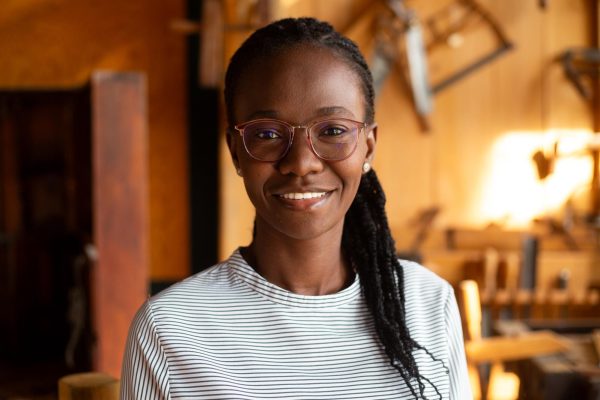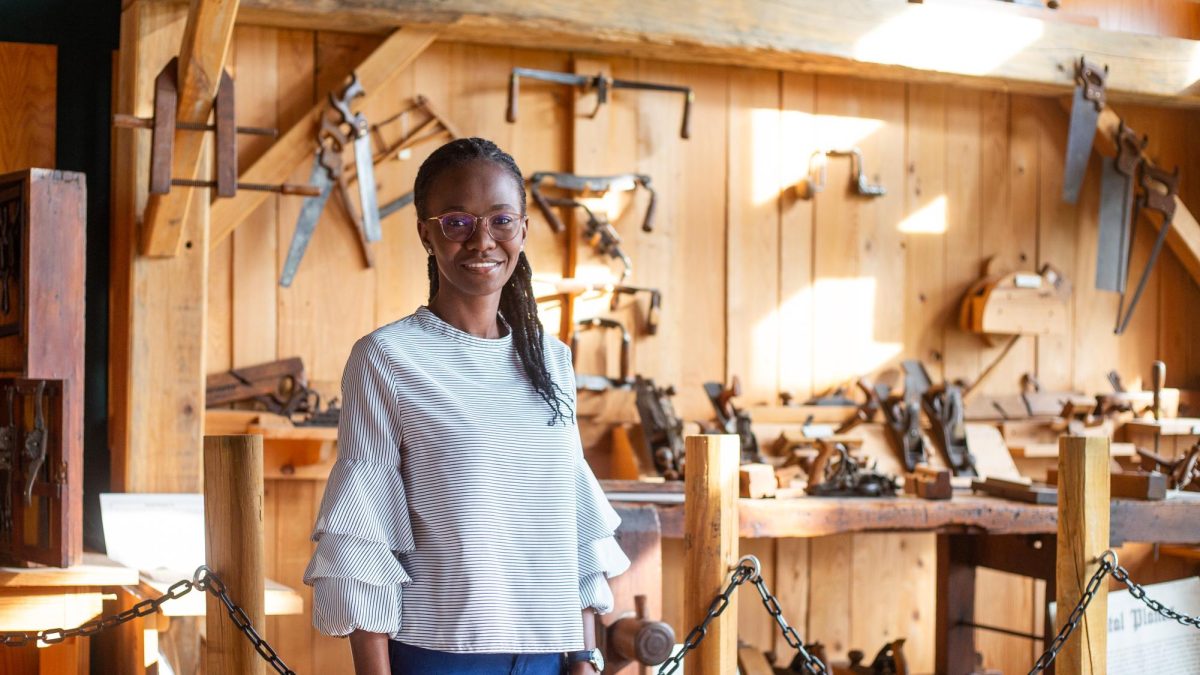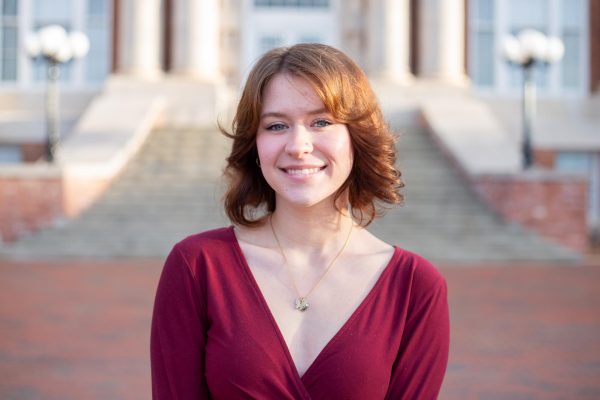Clusters of red and yellow umbrellas catch the sunlight along the bustling streets of Ghana’s capital city of Accra. Beneath them, vendors toting wooden baskets are shielded from the glaring sun. The crowded sidewalks force people to spill out into the roads and walk alongside miles of cars. People bump elbows with one another, smiling and chattering, as the whizzing of motorcycles and humming of bus engines drone on.
Early each Saturday morning, a young Alberta Ebeheakey would leave the busy city streets as she and her family traveled two hours to her grandmother’s farm in Dawa, Ghana. Surrounded by nature, it was here that Ebeheakey developed a passion for the environment, one that would carry her far into adulthood and eventually, to the United States.
“Growing up I always knew I would end up working with the environment of sorts,” Ebeheakey said. “Initially, I wanted to be a wildlife photographer, but then I remembered – there are snakes in the forest.” A wide, toothy grin washed over Ebeheakey’s face as she sat poised, recounting her childhood dreams.
Ebeheakey decided to pursue an education in actuarial science, working with statistics and insurance. However, after Ebeheakey’s senior year of high school, she received an admission letter from Kwame Nkrumah University of Science and Technology, a public university in Kumasi, Ghana, to study forest resources technology.
“I told my mom ‘I have no idea what this thing is, so I am not going,’” Ebeheakey said. “And she said, ‘No, no, no, no, you have to go to school.’”
Early the next day, Ebeheakey’s mother embarked alone on the five-hour journey from Accra to Kumasi. Ebeheakey and her sister sat up at home, anxiously anticipating their mother’s arrival. Around 9 p.m., their mother burst in with an arm full of pamphlets and documents, prepared to explain to her daughter what lessons this school had to offer her. She assured Ebeheakey that she would love her studies and was prepared to strike a deal.
“So, here’s the deal, go for a year. Just listen to them speak, and if you don’t like it, we’ll change it to something that you would love,” Ebeheakey’s mother told her.
“And so, I went to school for the first year, and I enjoyed every part of it,” Ebeheakey said. “I called her once and told her, ‘Okay, I think I’ll continue with this.’”

Ebeheakey graduated with her bachelor’s degree from Kwame Nkrumah University of Science and Technology in 2010 and pursued her master’s degree from the same university. After graduating with her master’s degree, Ebeheakey found work as a timber inspector with the Ghana Forestry Commission in 2016. As a timber inspector, Ebeheakey was tasked with ensuring legality in the timber industry.
“Working with the forestry commission, I realized that even though we had laid down principles and guidelines on resource management, how to harvest, how to use resources, things were not as black and white as we see them,” Ebeheakey said. “I thought to myself, ‘what else can I do to help conserve natural resources?’”
It was a lifetime of moments that led Ebeheakey to her passion for sustainability and conservation. Ebeheakey recounted one experience she had in a sawmill in Ghana that drove her to change the way that people thought about conservation.
“I went to the sawmill, and the sawmiller had cut down this very small diameter log,” Ebeheakey said, gesturing with her hands the small width of the log. “In Ghana, we have trees that grow very big, but he went and cut it — it was mahogany. So, I asked him, ‘How old are you?’ and he says he is 50. And then I asked him, ‘How old is your oldest child?’ and he says his oldest child is 14 years, and I ask him if he knows that once you go to the forest to harvest trees, you have to wait 40 years for that area to regenerate naturally by itself. But this is the 10th or 11th year, and you have gone to cut down this log. ‘So, what do you want your children to use when they grow big? What trees are your children going to use when they get to 25 years?’”
Ebeheakey continued, emphasizing the importance of changing the way people think about sustainability.
“This is how we have to think of sustainability. We have to question ourselves, ‘is what I am doing going to help my children in the future,’” Ebeheakey said. “I realized that most people don’t think that way. It is sad.”
In 2018, Ebeheakey was allowed to explore other avenues of conservation efforts. Ebeheakey left Ghana with a team of four to come to the United States as visiting scholars. Ebeheakey and her team spent three months training at the USDA Forest Products Laboratory in Madison, Wisconsin. This is where Ebeheakey was introduced to the XyloTron, an AI-powered wood identification tool created to help combat illegal logging.
After completing her training, Ebeheakey and her team returned to Ghana and trained over 100 timber inspectors on how to incorporate AI technology into their work.
“After doing all of that, I felt like I had reached a point, and it was like I had plateaued. I needed something more because I realized that there was more to do with artificial intelligence, there was more to do with all of that in helping to curb illegal logging,” Ebeheakey said. “So, that is when I started looking for graduate school and I ended up here at MSU.”
In 2023, Ebeheakey returned to the U.S. to pursue her doctoral degree at Mississippi State University. Ebeheakey now works with MSU’s Wood Identification Team as a graduate research assistant in the Department of Sustainable Bioproducts. Since spring 2020, MSU’s Wood Identification Team has been utilizing artificial intelligence to further develop the XyloTron.
The XyloTron, designed by the U.S. Forest Products Laboratory, is a system that uses a camera, lens and laptop for wood identification in a matter of seconds. The identification models are rectangular, handheld devices equipped with imaging hardware to analyze wood species, and each model can be designed to suit users’ specific needs. These models are field-deployable, meaning timber inspectors, harvesters, buyers and sellers can use these models to identify wood species quickly and accurately.
Fellow team member and graduate research assistant Miftah Rahman described how the XyloTron’s efficiency in wood identification can help curb illegal logging internationally.
“For international trading, sometimes trade cities have limitations of some species because of its status – is it endangered. So, we protect some species to be banned from trade. We have to make sure that we use the correct species,” Rahman said. “In the future we want rapid testing of wood identification. Some methods need time and economically cost, so we want the rapid testing so that we can get the answer as soon as possible, so that we can know the species in the field, the forest.”
According to a report by Global Financial Integrity, illegal logging accounts for between 10% and 30% of all globally traded timber, with those rates increasing up to 90% for tropical timber. A 2016 report from the Forestry Commission revealed that since 1990, nearly 80% of Ghana’s forest resources have been lost to illegal logging.
Ebeheakey spoke on the devastating environmental consequences that illegal logging.
“One of the main consequences of illegal logging is biodiversity loss and how it affects our environment,” Ebeheakey said. “We are always talking about sustainability, using the resources now and leaving something for future generations to use. If we are just logging anyhow without thinking about proper natural resource management, there will be nothing left for future generations.”
MSU’s Wood Identification Team is working with the XyloTron to improve its accuracy, develop newer models and develop apps to make these identification models accessible to the general public.
Graduate research assistant Kyatt Spessert works with coding in the Department of Sustainable Bioproducts. Spessert has been tasked with creating a wood identification app to be used in Central America, Mexico and Caribbean countries, all of which are heavily impacted by illegal logging. The app is projected to come out by the end of this year.
Spessert spoke to Ebeheakey’s passion and dedication to the team.
“Much earlier last semester, Asi was in the lab every single day for two months or so just annotating images,” Spessert said. “She’s very diligent with everything that needs to be done, everything. She’s extremely helpful. Any sort of question even if you know she wouldn’t immediately know the answer, she will help you find the answer. She just enjoys doing that. She just enjoys helping other people. That’s really the best thing you can ask for in a coworker.”
After living outside of Ghana for just over a year, Ebeheakey has begun adjusting to life in Mississippi. Through true southern hospitality shown by Mississippi State faculty and Starkville residents, the smiling faces of Ghana shine through.
“Here, people say, ‘Oh hi, hello, how are you doing?’ Everybody meets you with a smile,” Ebeheakey said. “Most places [in Ghana] have this same sense of oneness, this sense of unity. It’s something that most tourists describe Ghanaians as being very friendly, warm people.”
As Ebeheakey plants new roots in Starkville, the rest can be traced back to her grandmother’s farm in Dawa, Ghana, where she spent each weekend alongside her sister and mother.
Ebeheakey is sure she would have her mother’s support in moving to the United States. She spoke fondly, reminiscing on her mother’s kind, supportive nature.
“She was the kind of mother who would support you in anything,” Ebeheakey said. “Anytime we went to her with a problem, her first question would be ‘Have you prayed about it? You should pray about it before coming to me because it is God who will give me the wisdom to guide you.’”
Ebeheakey continued.
“I can only imagine how she would have felt if she were alive, and I told her I had the opportunity to come receive my Ph.D. in the U.S. In 2018, when I was coming here as a visiting scholar for three months, she was all over the place,” Ebeheakey said. “I can only imagine how she would feel if she was here.”
Ebeheakey’s sister continues to be a source of support for her life in America.
“My sister said, ‘I know how you think about conservation and people who do not think like that, and you have this opportunity. Please go. Even though I am sad you are leaving me, I am happy that you have this opportunity,’” Ebeheakey said, recounting her sister’s encouragement of her journey to America.
Ebeheakey plans to graduate from MSU with a doctoral degree in spring 2026, and beyond that, she is unsure of what her future holds.














